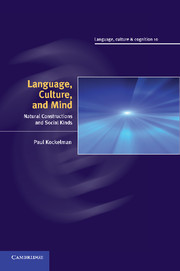Book contents
- Frontmatter
- Contents
- List of illustrations
- Acknowledgements
- 1 Language, culture, mind: emblems of the status human
- 2 Inalienable possessions: what hearts, mothers, and shadows have in common
- 3 Interclausal relations: how to enclose a mind by disclosing a sign
- 4 Myths about time and theories of mind: why the moon married the sun
- 5 Other minds and possible worlds: when psychological depth is dialogical breadth
- 6 Interjections: why the centre of emotion is at the edge of language
- 7 Conclusion: natural constructions and social kinds
- Appendix A Transcription conventions
- Appendix B The Marriage between the Sun and the Moon
- References
- Index
1 - Language, culture, mind: emblems of the status human
Published online by Cambridge University Press: 04 May 2010
- Frontmatter
- Contents
- List of illustrations
- Acknowledgements
- 1 Language, culture, mind: emblems of the status human
- 2 Inalienable possessions: what hearts, mothers, and shadows have in common
- 3 Interclausal relations: how to enclose a mind by disclosing a sign
- 4 Myths about time and theories of mind: why the moon married the sun
- 5 Other minds and possible worlds: when psychological depth is dialogical breadth
- 6 Interjections: why the centre of emotion is at the edge of language
- 7 Conclusion: natural constructions and social kinds
- Appendix A Transcription conventions
- Appendix B The Marriage between the Sun and the Moon
- References
- Index
Summary
Converting desire into pain
The setting is my host's home, sitting around the hearth fire. The protagonist is Maynor, a three-year-old boy known for his angry antics. One morning, he pushes his tiny chair over, narrowly missing the anthropologist's outstretched foot. His ten-year-old cousin, visiting for breakfast, is the only family member who notices. Ay dios (goodness!), she exclaims, calling the boy's mother's attention to his misbehaviour, xten raj li roq' laj Maynor (Maynor would have hit his foot). Maynor's mother rights the chair and then asks the little boy point blank: ma taawaj li la (Do you want the stinging nettle?). Maynor sits back down, shaking his head, eyes on his mother, frowning. The anthropologist moves his foot out of range.
In this example, the girl uses the counterfactual particle raj to describe Maynor's action. Without this particle, her utterance could simply be glossed as ‘Maynor (has) hit his foot’, indicating that in the world of the speech event, the girl is committed to the truth of the narrated event. With the counterfactual particle, however, she signals that she is committed to the truth of the narrated event in a world other than that of the speech event. In effect, she says, ‘In another world (but not in this one), Maynor hit the anthropologist's foot’.
Building on some ideas from Goffman (1981a) and Jakobson (1990a), we might say that this counterfactual particle serves to distinguish the speech event from what may be called a commitment event.
- Type
- Chapter
- Information
- Language, Culture, and MindNatural Constructions and Social Kinds, pp. 1 - 13Publisher: Cambridge University PressPrint publication year: 2010

